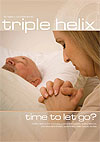What is health?
The World Health Organisation definition of health tells us Health is a state of complete physical, mental and social well-being and not merely the absence of disease or infirmity. (2) Bearing this in mind, it is hard to imagine anyone could be completely healthy. One small twinge, one tiny anxiety, one miniscule regret will all serve to compromise wellbeing as defined by the WHO.
Yet even the WHO definition is lacking, for as our palliative care colleagues eloquently point out, the causes of pain are multiple. Pain can arise from physical, social, emotional and spiritual causes. Spiritual pain can occur as a result of fulfilling the obligations of a chosen worldview. It can develop when contemplating the more general meaning of life, the universe, and everything. It can arise more specifically as a result of an individual considering and reflecting on the meaning of their own life. The term often used here is 'existential angst', encompassing the spiritual why? questions of life which can have such a powerful impact on health, and the answers to which form the view of the world we have.
For example, look at the impact on health in those with a nihilistic worldview, captured well in the descriptions of meaninglessness in the book of Ecclesiastes, or in the existentialist view, where to give life perceived meaning, suicide has to become an option. Consider the impact on health of those with a hedonistic worldview, as described in Isaiah: 'Let us eat and drink...for tomorrow we die!' (3) Assuming death is not tomorrow, this sounds like a recipe for liver disease.
Doctors as patients
As doctors we are generally very bad at looking after our own health. (4) (5) (6) We often are not registered with a GP, we have corridor consultations, we selfdiagnose, manage and treat. This lack of self care impacts negatively on us as individuals, but as John Donne says, no man is an island and our health and ill health also impact on our families, our colleagues and our patients.
Then there is the job. The sad fact is we have a job or vocation that appears by its very nature to make us more likely to become ill; be that stress, depression or burnout, or substance and alcohol misuse and suicide. Caring is costly, and Christians are not exempt. Maybe Christians are more at risk, as not only are we busy at work and home, but at church as well. We can spend so much time doing, there is little time just to be with God.
Doctoring doctors
There is then the question of doctoring. How do you doctor doctors? Many doctors find doctor patients more difficult to consult with, especially if they can be perceived as having greater clinical expertise. An interesting poem (7) reported by Lipsitt and Schneck perhaps crystallises this problem:
If a doctor is doctoring a doctor,
Does the doctor doing the doctoring
Doctor the doctor being doctored
The way the doctor being doctored
Wants to be
Or does the doctor doctoring the doctor
Doctor the doctor being doctored
The way the doctoring doctor usually doctors?
As doctors we need a doctor
As Christian doctors we need doctors to go to when we are unwell, to check our BP and Ischaemic Heart Disease risk factors. We need them to guide and care for us if depressed and stressed. We need them to look after our physical and emotional health needs, and while possibly not from the same background or faith perspective, to be aware of the importance of our social and spiritual health.
Yet as Christian doctors we need more. We are more than physical, emotional and social beings. We are spiritual beings and need to take care of and be cared for in the area of spiritual health, where our key focus is on loving God with all our heart, soul, mind and strength and in loving our neighbours as ourselves. As Christian doctors we need a doctor. The beauty is that we do have a doctor, a great physician, we can turn to. Jesus tells us that he came for us, those who are not healthy, for after all it is not the healthy who need a doctor, it is the sick. (8)
Jesus the physician
Jesus, our physician, gives us a prescription for health from Deuteronomy (9) and repeated in various forms in Matthew, Luke and Galatians. (10) 'Hear, O Israel: The Lord our God, the Lord is one.' We are to listen to the God who is trinity, yet also unity, the God in whose image we are made. We must then love the Lord our God with all our heart and with all our soul and with all our strength. To this in Matthew is added a second commandment: 'Love your neighbour as yourself'. (11) Love God, the greatest commandment. The next is to love neighbour as self. As Christians we do need to love God, and from this, to love our neighbours as we love ourselves.
This is where Christian doctors often face a rather concerning problem, for if we look around at ourselves and our colleagues, we may begin to feel very sorry for our neighbours, if the standards set are so low. Do we really want to love our neighbours the way we love ourselves – by expecting them to work all hours, to compromise on time with God, family, fun and relationships? Or do we not rather want them to have a healthy work life balance, where time with God and neighbour is a priority and not squeezed out as life is too busy?
David Short in an article on vocation entitled 'More than just a job' tells us this. (12) 'The budgeting of time, essential for all doctors, is absolutely crucial for the Christian who is determined to glorify God at work. Time must be allocated for recreation, for spouse and family, and for communion with God. All are vital, particularly the last.' Psalm 1 would back this approach. Blessed is the man, we are told, whose delight is in the law of the Lord and on his law he meditates day and night. Blessed – healthy in the fullest sense of the word. If we do this we will automatically, on a daily basis, put on the armour of God, (13) and we will bear the fruit of the Spirit. (14)
Good doctors
Take the fruit of goodness. What is goodness like in medical practice? Micah 6:8 guides us:
He has showed you, O man, what is good.
And what does the LORD require of you?
To act justly and to love mercy
and to walk humbly with your God.
God has shown us what is good, and goodness is not just about doing, it is also about being. It is about acting justly, whether it be in speaking up and acting to address health inequalities locally and nationally, or in target data submissions, tax returns and claim forms. It is about trustworthiness and integrity. Goodness is about loving mercy. This can be demonstrated in the intuitive and often gut wrenching feeling of compassion and mercy that God develops in us for others. This mercy arises from our being, and is a way God uses to touch the patients we meet and care for – even the ones we find more difficult.
In this way we become good doctors. Justice and mercy help us maintain good relationships with both colleagues and patients, thereby loving neighbour. They also support us in demonstrating the General Medical Council duties of a doctor. Good Medical Practice (15) tells us: 'Good doctors make the care of their patients their first concern: they … maintain good relationships with patients and colleagues, are honest and trustworthy, and act with integrity'. The guidance of scripture and the fruit of the Spirit are a pretty sure way of fulfilling these duties. The only way by which all of this becomes possible is by walking humbly with our God.
The recipe for healthy doctors
In scripture we therefore have a 'recipe' for truly healthy doctors who in turn can have a positive impact on the health of their patients. This recipe does not guarantee physical, emotional or social health the way the world defines it. However it does promise a more holistic view of health, which includes our spiritual health.
Love God and walk with him humbly. Love your neighbour as also you love yourself. As Ezekiel tells us, God, by giving us a new heart and putting a new spirit in us, moves us to follow his decrees and keep his laws – a sure way to spiritual health. (16) As doctors we need doctors. We need to see them for our own physical and emotional health needs. But as Christian doctors let us make sure we take time to consult with the greatest physician, so that we can become truly healthy.
































